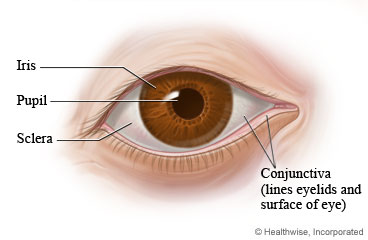Chemical Burns to the Eye: Care Instructions
Overview

Chemical burns to your eye can cause keratitis. Keratitis is an inflammation of the cornea. The cornea is the
outer, clear layer that covers the colored part of your eye and pupil. If you get chemicals in your eyes, it
may take as long as 24 hours to know if there is damage. Your eyes will be flushed with water to reduce the
chance of serious damage.
Your doctor may have put a few drops of medicine into your eye to help reduce swelling and to prevent
infection and scarring. Your doctor may also have given you an eye patch or a special type of contact lens to
wear while your eye heals.
The doctor probably used medicine to numb your eye. When it wears off in 30 to 60 minutes, your eye pain may
come back. Your doctor may give you medicine to help relieve the pain.
You may need to follow up with an eye doctor for another exam or more treatment.
Follow-up care is a key part of your treatment and safety. Be sure to make and go to all
appointments, and call your doctor if you are having problems. It's also a good idea to know your test results
and keep a list of the medicines you take.
How can you care for yourself at home?
-
If your doctor gave you ointment or eyedrops, use them as directed. Use the medicine for as long as your
doctor tells you to, even if your eye starts to look and feel better. Wash your hands before using the
medicine.
-
To put in eyedrops or ointment:
-
Tilt your head back, and pull your lower eyelid down with one finger.
-
Drop or squirt the medicine inside the lower lid.
-
Close your eye for 30 to 60 seconds to let the drops or ointment move around.
-
Do not touch the ointment or dropper tip to your eyelashes or any other surface.
-
Be sure to use only the eyedrops your doctor prescribed. Do not use over-the-counter eyedrops because they
may make your symptoms worse.
-
Do not use a contact lens in your hurt eye until your doctor says you can.
-
Do not wear eye makeup until your eye heals.
-
Be safe with medicines. Read and follow all instructions on the label.
-
If the doctor gave you a prescription medicine for pain, take it as prescribed.
-
If you are not taking a prescription pain medicine, ask your doctor if you can take an
over-the-counter medicine.
-
For the first 24 to 48 hours, limit reading and other tasks that require a lot of eye movement.
When should you call for help?
 Call 911
anytime you think you may need emergency care. For example, call if:
Call 911
anytime you think you may need emergency care. For example, call if:
Call your doctor now or seek immediate medical care if:
Watch closely for changes in your health, and be sure to contact your doctor if:
Current as of: June 5, 2023
Content Version: 14.0
Care instructions adapted under license by your
healthcare professional. If you have questions about a medical condition or this instruction, always ask
your healthcare professional. Healthwise, Incorporated disclaims any warranty or liability for your use of
this information.